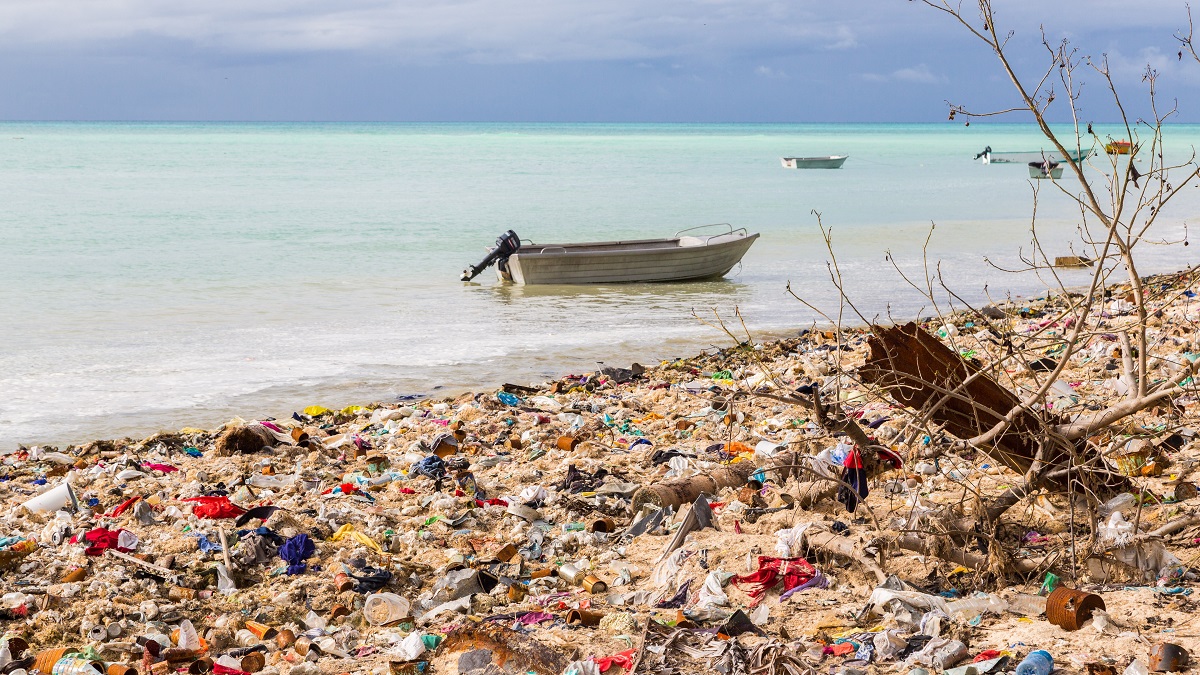Funding from the United Kingdom extends to the region UNCTAD’s work on sustainable manufacturing and plastic substitutes.

© maloff/Shutterstock | Plastic pollution on a beach in South Tarawa, Kiribati.
The UK’s Foreign, Commonwealth and Development Office (FCDO) and UNCTAD have extended to the Indo-Pacific region a joint programme that works with governments, researchers and businesses to reduce manufacturing’s environmental footprint in developing countries.
The Sustainable Manufacturing and Environmental Pollution (SMEP) programme, which the FDCO and UNCTAD have been implementing in sub-Saharan Africa and South Asia since 2019, helps countries better align environmental and industrial policies by identifying local raw materials and products that could be used as plastic substitutes.
For example, the programme currently supports the development of biodegradable fishing nets in the Democratic Republic of Congo and alternative mulch films used in the agriculture and food packaging sector in Nigeria.
“The Indo-Pacific region is home to countries that are extremely vulnerable to the consequences of environmental damage and plastic pollution,” said Teresa Moreira, officer-in-charge of UNCTAD’s division on international trade and commodities.
“But these countries have a strong will to move away from a plastic-intensive economy and are eager to develop the productive capacities needed to do so.”
As part of initial activities in the Indo-Pacific region, UNCTAD co-hosted the second Global South Nexus Conference at Curtin University, Australia, where an updated dashboard from the programme was presented. It compares the environmental impact of replacing plastic with several substitutes.
“The updated dashboard will help the region’s policy makers assess the trade-offs associated with various plastic substitutes,” Ms. Moreira said.
A vast marine region under threat
The Indo-Pacific is a vast marine region of two dozen countries connected and surrounded by water – from the Indian Ocean to the Pacific Ocean’s western and central zones. Many of the nations’ businesses and people rely on marine resources for trade, food, jobs and income.
Fiji, for example, exported almost $85 million of processed fish in 2020, making it the island nation’s second most exported product. About 31 million people work in the fishing sector in the Asia Pacific region.
But the region’s manufacturing sectors – along with “floating islands” of plastic pollution arriving from other continents – are harming its marine biodiversity through the widespread use of plastic packaging and products, as well as discarded and lost fishing gear. The impact threatens the fishing industries and hinders the hospitality sector’s recovery from the COVID-19 pandemic.
“The examination of plastic management services and material substitutes can offer a sustainable solution for the environment and ocean-based industries in the region,” said Jonathan Hassall, lead adviser at FCDO.
“The SMEP programme can provide tangible results, as it works with both policy enablers and experiences from on-the-ground projects.”
North-South collaboration
Countries in the Indo-Pacific region have many natural resources that could be used to develop nature-based substitutes for plastics. These include minerals, coconut husks, agricultural residues and algae.
But many companies in the region’s developing countries lack the technologies and capacities needed to produce nature-based plastic substitutes at a scale that would make them profitable.
Scaling up the production of such plastic substitutes will depend on strengthening collaboration between developed and developing countries. And this is at the heart of the SMEP programme.
By facilitating policy discussions that could help get technology and funding from the global North to the global South, the programme will help companies in the region overcome the hurdles they face to boost the production of plastic substitutes.
“Intellectual property and productive capacities in the Indo-Pacific region could really benefit from access to markets in the global North, allowing for the expansion of novel solutions invented in the global South,” said Atiq Zaman, from the Curtin University Sustainability Policy Institute in Australia, where the SMEP dashboard is used.
As part of the programme’s work in the region, UNCTAD plans two studies – one on the services dimensions of plastic pollution mitigation and another focusing on specific sectors where the transition to plastic substitutes is important for the region’s developing countries.
Technical assistance is also planned to help governments in the region strengthen their messaging in the UN’s Intergovernmental negotiating committee on plastic pollution process and the World Trade Organization Dialogue on Plastic Pollution.


